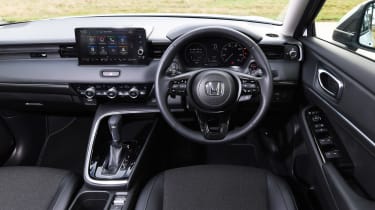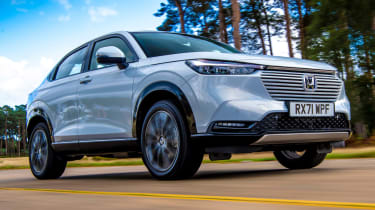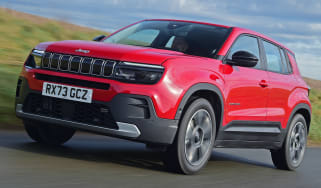Honda HR-V: old vs new
The Honda HR-V is a reliable, easy to live with small SUV - does the new hybrid model improve on the formula?
The Honda HR-V is the Japanese manufacturer's small SUV, which slots into the range between the family-friendly Honda CR-V and practical supermini Honda Jazz. Since the first HR-V first arrived in 1999, it has offered buyers a raised seating position and extra space without the exorbitant running costs of a genuine 4x4.
 Top 10 best hybrid SUVs in 2025
Top 10 best hybrid SUVs in 2025
Instead of mud-plugging capabilities, the HR-V was always intended to deliver hatchback-like road manners and most versions are front-wheel drive as a result. Small petrol and diesel engines have helped boost efficiency, and the latest model is only offered as a hybrid petrol in the UK, helping it stand out against rivals like the Nissan Juke, Ford Puma and Skoda Kamiq.
It's a popular and crowded area of the market in which other alternatives include the Hyundai Bayon and all-electric Kia Soul. A new version of the Honda HR-V was launched in 2021 and in this comparison we'll see if the brand-new model or a low-mileage used HR-V is the better buy.
Interior
While Honda has an excellent reputation for making sturdy, reliable cars, one area which has come in for criticism is its interiors. ‘Conservative’ is one word to describe Honda's interiors but ‘bland’ would be another, if you’re feeling less generous. The 2015 HR-V combated this by putting vents across the dashboard, in a slightly unusual move, and trimming the fascia in a soft-touch material with contrasting colours in top versions. However, even when the HR-V launched, its infotainment screen already looked like a rather dated aftermarket addition.
The new HR-V does better in this department; not only does its interior look more cohesive and upmarket as a whole, its infotainment display now perches on top of the dash and boasts far more up to date software and graphics. There are three trim levels and standard equipment is generous, including LED headlights, heated seats, all-round parking sensors, a rear-view camera and keyless entry.
Practicality and boot size
It's the norm for manufacturers to point out how every aspect of a new model has improved, whether it be boot space or efficiency. But the HR-V is an outlier so far as practicality is concerned because the new hybrid powertrain has had quite a severe impact on boot space.
While the outgoing HR-V was billed as one of the most practical small SUVs, with a generous 448 litres of space behind the rear seats – 18 more than the equivalent Nissan Qashqai – the new model sees this shrink to just 319 litres. That will be disappointing for families graduating from a hatchback, who may find the HR-V actually has less boot space.
There are some redeeming features, like Honda's Magic Seats, which allow the rear seat bases to flip up, creating a tall space behind the front seats for awkwardly shaped items.
Engines and economy
Originally, the previous HR-V was available with either diesel or petrol engines but the diesels were discontinued in late 2020. This left the 128bhp 1.5-litre petrol, which offered reasonable performance with a slick six-speed manual gearbox but wasn't quite as adept when paired with a CVT automatic transmission. The latter made the petrol feel sluggish and noisy, especially when accelerating onto a motorway or overtaking.
A facelift added a 180bhp 1.5-litre petrol engine, making the HR-V far more lively, with 0-62mph taking an impressive 7.8 seconds. It certainly improved performance but this engine, borrowed from the Civic hatchback, felt slightly out of place in the HR-V. It's also rather thirsty, returning up to 42mpg with CO2 emissions from 151g/km – not ideal for company-car buyers paying CO2-linked BiK tax.
The hybrid setup in the latest HR-V will be good news for them, with figures of up to 52.3mpg and 122g/km of CO2 looking a lot more appealing. Hybrid technology also has the advantage of being more affordable than the plug-in hybrid tech seen in rivals like the Renault Captur E-Tech Hybrid.
This time, a 1.5-litre petrol engine is joined by two electric motors and in most situations the HR-V feels more like an electric car to drive. As in the previous model with a CVT gearbox, however, the petrol engine can sound rather coarse when longer bouts of acceleration are needed.
Verdict
There's a lot to like about the new Honda HR-V. It has a more distinctive design inside and out, quality has improved and its hybrid powertrain has reduced tailpipe emissions, cutting running costs in the process. Its infotainment setup is also a lot more advanced.
There's no getting away from the reduced practicality of its small boot, however, which could be a dealbreaker for families. If you need more space than the new model offers, there are some good deals to be had. We found a one-year-old HR-V in the top EX trim with under 12,000 miles for several thousand pounds less than a new entry-level model.
Read our picks for the best small SUVs on sale today.
Recommended

Rugged Volvo EX30 Cross Country arrives with £47k price tag

New Land Rover Defender Sport spotted and it’s an electric baby SUV

SEAT releases new Black Edition models with sportier styling
Most Popular
Tips & advice

Car dashboard warning lights: what does each symbol mean?

Electric car charging stations: public networks, charger types, apps and maps











